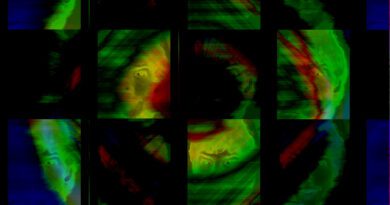A Chat with Layla Kaylif (09.06.25)
Layla Kaylif is an English singer-songwriter and filmmaker celebrated for her poetic lyrics and genre-spanning sound. With a unique voice that bridges East and West, Kaylif continues to defy expectations, moving effortlessly from spiritual pop to Americana to cinematic balladry. We speak with Layla Kaylif to discuss her new single ‘God’s Keeper’, and more below.
OSR: ‘God’s Keeper’ feels both intimate and expansive – can you walk us through the first spark of inspiration behind it?
Kaylif: The song was inspired by religious fanatics who assume the role of God’s enforcers – self-appointed keepers of the divine will. They move through the world like vigilantes, imposing their narrow vision of God’s mandate, often at a tragic cost to human life. We see this dangerous zealotry play out in places like Israel/Palestine and Myanmar, parts of the United States, even – a perfect storm of end-times obsession and spiritual ego, where sacred texts are twisted into justification for violence. At its core, the song is a lament for this distortion of religions and faith, all of which hold human life as sacred. But it’s also a call to redemption and a compassionate gaze toward these lost souls, consumed by false righteousness. Because in truth, it is not man who is the keeper of God. God is the Keeper of us.
OSR: The song wrestles with spiritual and existential themes. What role does faith or spirituality play in your creative process?
Kaylif: As I got older, I started exploring spiritual ideas more deeply. Then, during a period of making music in Miami in the early 2000s, I had a truly life-altering experience. It was deeply spiritual and completely shifted my worldview. That moment led me back to my faith, but not in the way I had known it as a child. It was through a more mystical lens, a stream of Islam that resonates with the essence of Sufism: love, surrender, and inner truth. I love Ibn Arabi, the great Andalusian philosopher and Sufi mystic, for saying, ‘My heart has become capable of every form.’ That line speaks so deeply to me. It captures the essence of spiritual expansiveness, of transcending rigid boundaries and allowing love, truth, and the Divine to move through you in all forms. It’s the opposite of fear-based religion. It’s a surrender to unity. That idea has guided much of my journey, both spiritually and artistically.
OSR: You’ve said this track came from a place of “spiritual conflict.” How did that inner tension shape the songwriting?
Kaylif: It comes from the spiritual conflict of the type of individual I am addressing in the song, because I don’t think their certainties are based on deep spiritual convictions. I think they are actually based on inner conflict, emotional cowardice, fear and a certain kind of hardened heart. But you know, it’s my lens. Every human is walking their own path. In the end it’s all a mystery.
OSR: There’s a fascinating ambiguity in the lyric, “Who keeps who?” – is that ambiguity intentional in your writing?
Kaylif: That’s not a lyric in the song, but there’s certainly ambiguity in the song’s lyrics overall, and it’s more paradox than ambiguity, I would say. But generally speaking, I do ‘veil’ my ideas in my lyrics. It’s a form of self-censorship that I’ve turned into art.
OSR: How did working with Johan Bejerholm influence the final sound of ‘God’s Keeper’?
Kaylif: Well, he created that sound; he’s the producer. He deserves all the credit. I wrote the lyrics mainly.
OSR: The track features subtle Middle Eastern undertones. How do you consciously navigate blending your English-Arab heritage into your music?
Kaylif: Again, as Johan did, I think my lyrics often lean into spiritual themes, and since I’m half Arab, producers can’t resist throwing in some Middle Eastern vibe. Some would say it’s a bit orientalist or exoticising of me, and I would agree! Again, I use that musical foundation as a means to communicate my ideas through lyrics, so I don’t mind. If I were singing rubbish, I’d think it was reductive and cheap. You know what I mean.
OSR: How has your approach to storytelling evolved from earlier songs like ‘Shakespeare in Love’ to ‘God’s Keeper’?
Kaylif: My songs are eclectic in terms of genre. I never stick to one genre. It’s not a straight line. In fact, the first song I recorded was a dance track called ‘Slaves in Heaven’ with the Ancestors of Sound. You can find it online. It’s a house track with esoteric lyrics that talk about religious fanaticism.
OSR: Do you see yourself more as a songwriter, a storyteller, or a seeker, or all three?
Kaylif: I see myself as a struggling artist. No, I am definitely all three.
OSR: You’re also a filmmaker. How does your visual storytelling influence your songwriting, or vice versa?
Kaylif: I did make one film, so I don’t know if that qualifies as a filmmaker. I’m trying to make a second, but it’s hard. But I do draw, in fact, that was my first artistic expression as a kid, and I do use visuals (AI-generated art is my new obsession) and lyrics before sound, so the long answer is, yes!
OSR: If ‘God’s Keeper’ marks a full-circle moment, what would you say you’ve returned to or rediscovered in yourself?
Kaylif: To be honest, I think it doesn’t mark a full circle, I think that’s what someone wrote in a review! My life is more of a spiral than a full circle.
Many thanks to Layla Kaylif for speaking with us. Find out more about Layla Kaylif on her Instagram and Spotify.


